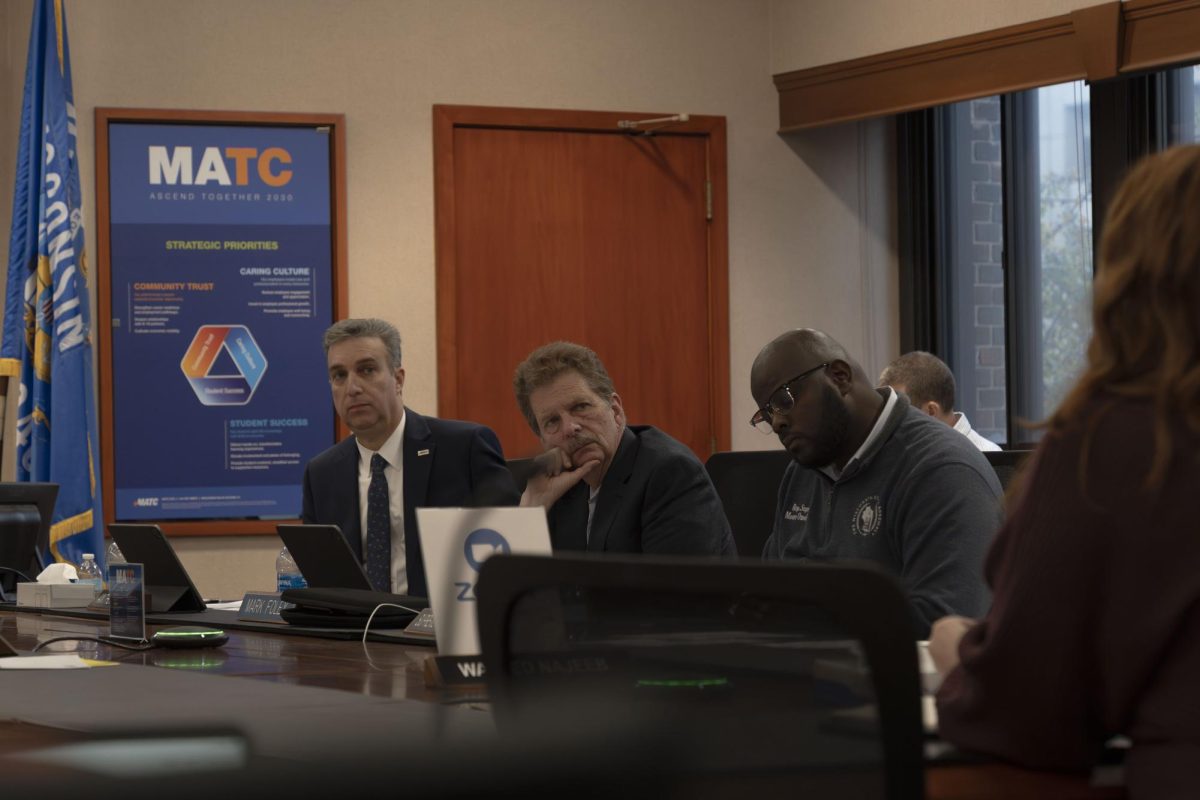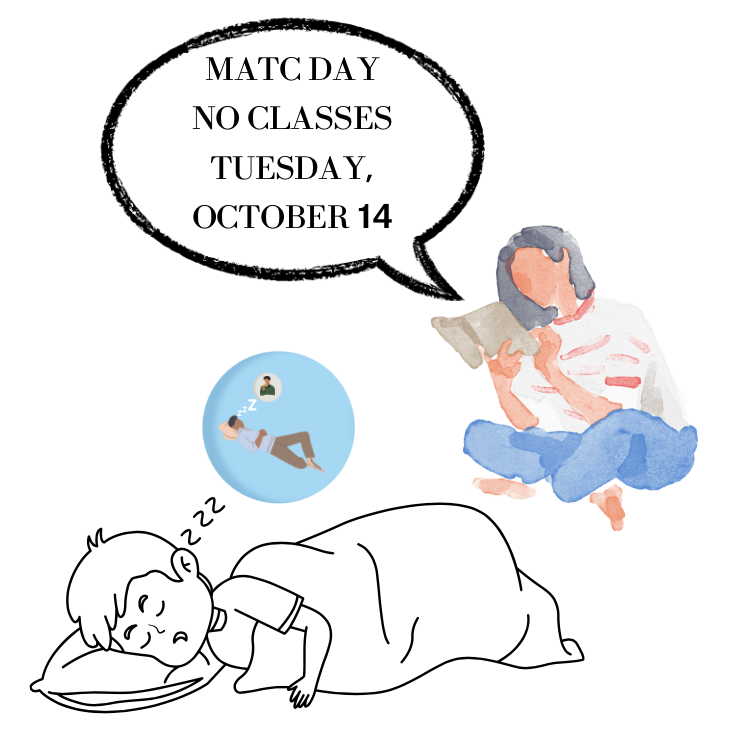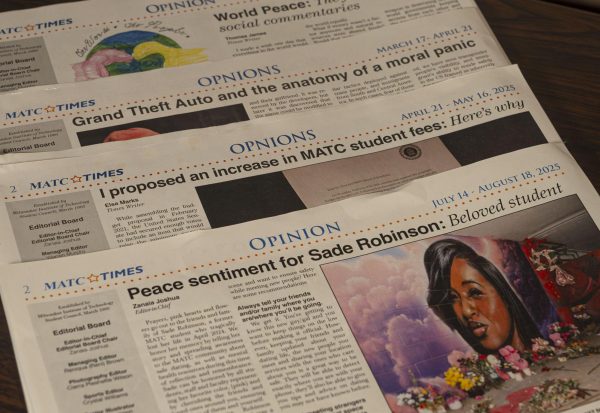Saturating voting polls in future elections may be just a step away
Photo by TNS
Voters voting at the Menomonee Falls Public Library in Menomonee Falls, Wis., on Tuesday, April 5, 2016. (Michael Sears/Milwaukee Journal Sentinel/TNS)
Candidates can better serve voters if ballots had a survey that exemplified voters’ choices on popular topics through: Optional Representative Samples. Many voters don’t agree with all political views of their potential candidates whether Republican, Democrat or all those in between. They are annoyed to be lumped under one single political classification. As a result, the absence of popular topics on ballots can keep people from voting because it restricts the signature voice of each constituent. An addendum will open the lines of communication between candidates and citizens, and empower the voice of each constituent and will be apt to galvanize a greater voter turnout.
Most voters, upon selecting a political candidate, desire a more tailored ballot to represent various facets of their beliefs. Otherwise with the absence of effective, representative surveys on ballots, voters’ choices are assumed to completely embrace all the conservative or liberal views often shaping their platform, and in most circumstances, these sentiments barely stand true. In fact, there may be just one critical belief powerful enough to nudge a voter’s choice between a Republican or Democrat candidate.
One of the most frequent indicators of a voter’s choice involves income demographics, and religion is a pointer of various facets that follow. Generally, many of the rich and privileged citizens tend to vote Republican, while the middle and working class citizens tend to vote Democrat. According to www.debt.org, Republican candidates acquire a greater percentage of votes of citizens with incomes $50,000 or more.
The $50,000 income threshold of Republican supporters is also reflected in “American Government and Politics Today.” Both resources pose Republicans are more committed to religion while Democrats appear to be on a decline. People with higher income give more monetary donations and thus appear to be dutiful and easily portrayed as more heartfelt. Republicans have gained this stronger image. Which party is the most religious remains questionable.
The appalling language toward women that evolved from Donald Trump, the Republican presidential candidate, questions his viewpoints and observed temperament. This seems problematic even for some of his conservative colleagues. If that’s not bothersome enough, questions on the accountability of classified email materials are raised with Democrat presidential candidate Hillary Clinton. Whether Republican or Democrat, for those potential voters annoyed by an election establishment, representative samples on election ballots can differentiate and extend each constituent’s voice.
In addition, not having the opportunity for constituents to express popular topics during an election can be profoundly irritating and may result in the loss of a vote. A representative sample on a popular topic builds a level playing ground to strengthen the voice of all voters. Notice these potential constituents’ responses when asked, what is their political party preference? What distinguishes them from other political colleagues? What popular political topics they feel need a breakthrough and what benefit representative samples could bring to an election ballot. The respondents’ replies follow:
Andrew Hopgood, Human Service program student at
MATC explains, “It sometimes irks me to vote at all because I differ with many conservative and liberal views. I am a Christian that tends to vote Democrat; however, I struggle with some modern values. One thing I’m skeptical about is shared restrooms between heterosexuals and transgenders. Another political topic I feel needs urgent attention is former prisoners whose offenses lack bodily harm to others but remain labeled felons after prison time served. This is a form of on-going punishment that suppresses them from becoming productive citizens, and an opportunity to voice this concern on an election ballot would be great.”
James Brewer, owner of Overcomer’s Media, asserts, “Normally, I would vote conservative. Although 2/3 of the potential voters are not in favor of Hillary Clinton or Donald Trump, I can say I’m leaning toward voting for Trump. From the start, I have liked his campaign. He has shaken up the political establishments and has spoken out about essential issues most candidates resist. Like most Republicans, I feel strongly about government staying within their limit of the Constitution. Unlike most Republicans, I feel the conservative party needs to be more aggressive in supporting civil rights. Also, I believe, more caution ought to be taken by the judicial system concerning cases of capital punishment. In my opinion, the death penalty should only be suitable if a person is guilty of a murder beyond a reasonable doubt, after all appeals are exhausted. If implemented properly, representative samples would enhance the voter’s experience.”
Many Americans resonate with these same concerns. It would be appropriate to offer voters more opportunities. Representative samples ought to be optional, but conveniently accessible and easily filled out on ballots. It is essential that the sample continue to maintain a user-friendly ballot system.
A reformed political election process should not only tally popular candidate statistics for political leadership, but it should enable each individual constituent to exercise and strengthen their democracy. Such improvements are possible because the presidential election is the largest event in the United States where a vast number of people participate and the largest assembly where the political officials focus to serve American citizens.
Here are some examples of representative samples that can expand a voter’s voice on popular topics: Abortion, Border Security, Death Penalty, Equal Pay for Women, Drug Price Regulation, Felon Taxation, Free College Education, Gay Marriage, Government Mandates, Labor Unions, Minimum Wage, Prescription Marijuana, Medicaid and Obamacare. Opportunities for voters to voice their opinion would be separate and optional from their official votes but should be conveniently accessible on the ballot.
Overall, this is achievable with more detailed ballots. Elections ought to yield individual popular concerns as well as their choice of candidates.
Therefore, individuals will become more productively involved in a systematic, political process. This can spur voter turnout and strengthen social equality. We must remember, maximum involvement of a constituent voice is equally essential as the vetting process for any political candidate.
Provided such a reform, voters will be better served by candidates and more apt to saturate voting polls in near future elections.



































































